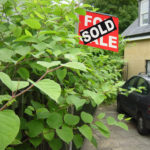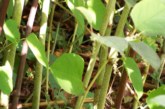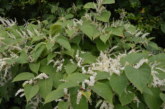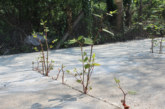A third of Brits would buy a property with Japanese knotweed, but at a reduced price – according to latest YouGov survey.
Japanese knotweed is no longer the deal-breaker it once was, with almost a third (32%) of British adults who are aware of it prepared to go ahead and purchase an affected property, but at a reduced price, according to new YouGov research commissioned by Environet UK – a leading specialist in the removal of Japanese knotweed
As awareness grows of the UK’s most invasive plant (78% of British adults are now aware of Japanese knotweed compared to 76% in 2018 and 75% in 2017) and the treatments and guarantees available to deal with it, homebuyers have greater peace of mind that it’s a problem that can be solved. As long as there is a professional treatment plan in place with an insurance-backed guarantee, they may not need to walk away from their dream home.
Of those who said they would proceed with the purchase at a reduced price, the majority (26%) would expect a discount of between 6 – 10%, while 15% would expect to knock off between just 1 – 5%. A further 15% would seek to reduce the price by more than a quarter.
Environet develops new tool for assessing Japanese knotweed risk
Nic Seal, Founder and MD of Environet said: “With an estimated 5% of all UK properties now affected by Japanese knotweed, either directly or indirectly, it’s encouraging to see homebuyers becoming increasingly rational in their approach. If left untreated, Japanese knotweed can cause considerable damage to a property which is why buyers and lenders are right to insist that there is a professional treatment plan in place before they agree to proceed.
“Due to the stigma around Japanese knotweed the property value will almost certainly be impacted, but all that’s required is a sensible renegotiation of the price. People are realising it doesn’t have to be a deal breaker.”
In Environet’s experience, a 10% reduction in the purchase price is typical in cases where property has been affected by the plant, dropping to around 2-5% if it has been professionally treated.
Japanese knotweed can now be completely removed within a matter of days, at any time of the year, using a digging out method that sifts the earth to remove all viable rhizome roots from the infected soil. It was first introduced into the UK from Japan in the 1850s as an ornamental plant, but it is now number one on the Environment Agency’s list of the UK’s most invasive plant species.




